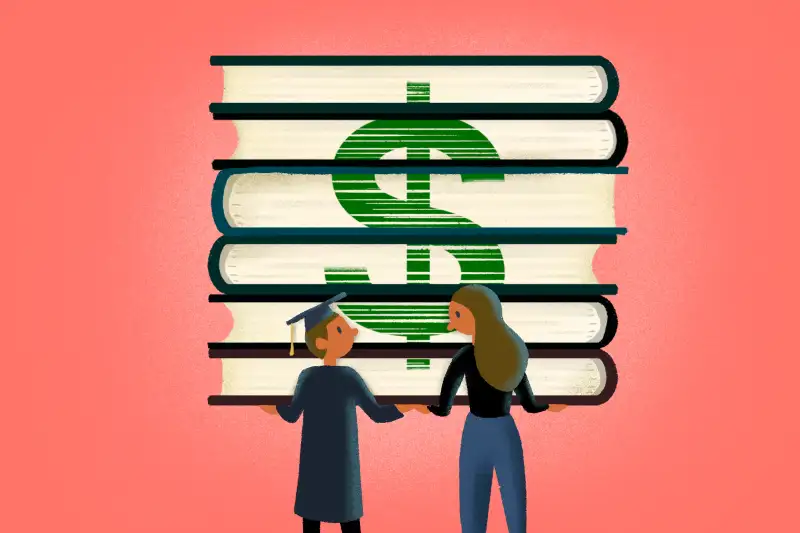Don't Co-Sign Your Child's Private Student Loan Without Answering These 3 Questions First

With the new school year just around the corner, many families are crunching numbers to figure out how they'll pay college bills come fall. For some, private student loans will be on their list of financing options to fill in the gap left after using scholarships, grants, and federal student loans.
But to qualify for this type of loan and get the lowest interest rates, you must have excellent credit and a stable source of income — something that’s out of question for most students, particularly those fresh out of high school. That’s why more than nine out of 10 undergraduate private student loans are co-signed, according to student loan marketplace Credible.
Experts stress that families should exhaust all of their federal aid options before turning to private loans. Unlike private student loans, federal loans don’t require the student to pass a credit check and nearly anyone with a satisfactory academic standing can get them. They offer low, fixed interest rates and flexible repayment options in case of financial hardship.
Still, as many 1 million undergraduate students a year turn to private student loans, according to The Institute for College Access & Success.
When you co-sign a private student loan (or any type of loan) you’re lending your creditworthiness to someone else, in hopes of improving their chances of getting approved.
“The pro is that the child will be able to go to school, the con is that you're now obligated to that debt as well,” says Donna Loitz, credit and student loan counselor at American Financial Solutions (AFS), a non-profit credit counseling agency.
And while this may seem like a small feat to help your kid get through college, it does come at a price. “It's heartbreaking to see families struggling because of education debt. So many kids change their mind and drop out, or don't follow through,” says Loitz.
Here are three things you should know before co-signing a private student loan.
Can You Both Handle the Shared Responsibility?
While the student is considered by the lender as the primary borrower, when you sign on the dotted line, you’re assuming full responsibility for that debt. This means that if for some reason the student is unable to pay back the loan once they graduate, drop out of school, or drop below half-time enrollment, you will be held accountable for making those monthly payments.
Although it's difficult to get student loans discharged through bankruptcy, if your child does file for bankruptcy and the court finds the debt unmanageable, it will be transferred to you. This means that you'd immediately become liable for those payments unless you file for bankruptcy, too, Loitz says.
How Will It Affect Your Credit and Borrowing Power?
Co-signing a student loan can affect your credit and ability to borrow in the future in more ways than you’d think.
Let’s start with the application. Most of the time, when you apply for a loan, the lender will need to review your credit report through what’s known as a “hard credit pull” or “hard credit inquiry.” While this is standard procedure, each hard inquiry can make your score drop by 5 to 10 points.
Next, your debt load, or how much money you owe to creditors, accounts for 30% of your FICO score. From a lender or employer’s perspective, co-signing is the same as borrowing a loan for yourself, because you’re still liable for the debt, according to the Student Borrower Protection Center. This means that once that loan is approved, there’s a possibility that your credit score will take yet another hit due to an increase in your debt load.
Co-signing the loan will also increase your debt-to-income ratio or “DTI” — even if the student has been making timely payments. The DTI is a percentage that shows how much of your monthly income is compromised by your debts. A higher DTI can make it difficult for you to apply for additional loans or lines of credit, which is something you need to consider if you’re thinking about refinancing your mortgage or applying for credit down the line. “Shopping for a lender that would work with them could be challenging,” says Loitz. “Depending on the lender, they may even require you to take your name off the co-signed loan to qualify.”
Finally, it will affect your payment history. If your child is paying the account consistently without missing a payment, your score could benefit from it. On the other hand, if they are late or miss a payment, your score will drop and, “the higher your score, the bigger the impact it has,” says Loitz.
Will You Be Able to Get Out of the Agreement?
Releasing a co-signer from a private student loan can be an uphill battle. “They almost make it impossible for you to qualify and be human,” says Loitz referring to all the hurdles borrowers must overcome to satisfy the lenders’ requirements.
Although these may vary from one lender to the next, to get your name removed from the loan, the student typically must pass a credit review and not have a history of late or missed payments, filed for bankruptcy, or applied for any hardship programs within the last two years. Besides that, they must have been paying the loan consistently for at least 12 to 24 months, and demonstrate they earn sufficient income to take on that debt on their own.
Even if you meet those hurdles, it’s still up to the lenders’ discretion. A 2015 report from the Consumer Financial Protection Bureau found that 90% of requests for co-signer release are denied.
Some lenders don’t even offer a co-signer release. If that’s the case, the student will have to refinance the loan to be able to remove you as a co-signer — and that’s no walk in the park, either. Refinancing a loan is basically taking out a new private loan to pay off your original loan, and so the primary borrower will have to meet the lender’s credit requirements to get approved without needing a co-signer. Besides this, there’s a chance that they’ll end up paying more in the long run if they can’t secure a lower interest rate.
It’s also extremely hard to get a private student loan discharged, even if the student passes away. All federal student loans are discharged if the borrower dies or becomes permanently disabled. However, with a private loan, if you’ve co-signed on that loan and the child passes away, you’re still obligated unless the lender has stipulated otherwise in the contract.
Here's the Bottom Line
If you’re thinking about co-signing a loan, Loitz recommends thinking about your long-term plans before you commit. “If you're trying to retire, or plan to refinance your home, or pay off whatever you need to, you have to look at how this is going to impact you long-term,” says Loitz. “There's so much pressure to do it, but it's never a good idea to just do it and figure it out later, which is what 99% of the people do.”
More from Money:
'COVID Is Different': How Coronavirus Upended the Rules of Investing in a Recession
Interest Rates for Federal Student Loans Set To Drop to Record Lows This Year
How We're Paying off $50,000 in Student Loans, Even With a Job Loss During Coronavirus
